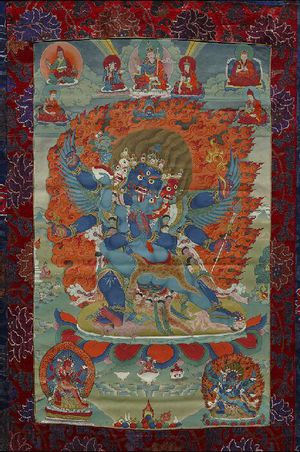Vajra Kilaya: Difference between revisions
SherabDrime (talk | contribs) mNo edit summary |
SherabDrime (talk | contribs) mNo edit summary |
||
| Line 4: | Line 4: | ||
One of the main yidams of the [[Nyingma School]] belonging to the [[Eight Sadhana Teachings]]. [RY]<br> | One of the main yidams of the [[Nyingma School]] belonging to the [[Eight Sadhana Teachings]]. [RY]<br> | ||
Many transmission lineages for Vajrakila exist. The various Vajrakila teachings are practised widely among the [[Nyingma]], [[Kagyu]] and [[Sakya]] schools. Most of the major [[gter ston]] had a Vajrakila [[gter ma]], sometimes even several. [[Chokgyur Lingpa]] (1829-1870) for instance had three: [[zab bdun phur pa]] corresponding the [[Maha Yoga]] class | Many transmission lineages for Vajrakila exist. The various Vajrakila teachings are practised widely among the [[Nyingma]], [[Kagyu]] and [[Sakya]] schools. Most of the major [[gter ston]] had a Vajrakila [[gter ma]], sometimes even several. [[Chokgyur Lingpa]] (1829-1870) for instance had three: [[zab bdun phur pa]], corresponding t the [[Maha Yoga]] class; [[lung lugs phur pa]], corresponding to the [[Anu Yoga]] class; and [[gsang thig phur pa]] which corresponds to the [[Ati Yoga]] class of the [[Three Inner Tantras]]. Other important Vajrakila teachings practised these days are the cycles of [[Ratna Lingpa]] (1403-1479), [[Lerab Lingpa]] (1856-1926), the various practises of the [[byang gter]] tradition of [[Rigdzin Godem]] (1337-1408) and the [[khon phur]] of the [[Sakya]] lineage. There are many more. In early times there were some disputes about the authenticity of the Vajrakila practises. They were laid to rest when the great [[Sakya Pandita]] ([[sa skya pan di ta kun dga' rgyal mtshan]] 1182-1251) found a fragment of the Sanskrit original of the Vajrakila Root Tantra in the library of [[Samye]] monastery. In the margins of this text were supposedly notes which indicated that it had belonged to [[Guru Padmasambhava]] himself. This text is nowadays included in the [[rnying ma bka' ma]], together with an extensive commentary on it by [[Jamgön Kongtrul Lodrö Thaye]] (1813-1899). [TSD] | ||
Revision as of 08:38, 20 October 2006
Vajra Kilaya, Vajrakila (rdo rje phur pa).
One of the main yidams of the Nyingma School belonging to the Eight Sadhana Teachings. [RY]
Many transmission lineages for Vajrakila exist. The various Vajrakila teachings are practised widely among the Nyingma, Kagyu and Sakya schools. Most of the major gter ston had a Vajrakila gter ma, sometimes even several. Chokgyur Lingpa (1829-1870) for instance had three: zab bdun phur pa, corresponding t the Maha Yoga class; lung lugs phur pa, corresponding to the Anu Yoga class; and gsang thig phur pa which corresponds to the Ati Yoga class of the Three Inner Tantras. Other important Vajrakila teachings practised these days are the cycles of Ratna Lingpa (1403-1479), Lerab Lingpa (1856-1926), the various practises of the byang gter tradition of Rigdzin Godem (1337-1408) and the khon phur of the Sakya lineage. There are many more. In early times there were some disputes about the authenticity of the Vajrakila practises. They were laid to rest when the great Sakya Pandita (sa skya pan di ta kun dga' rgyal mtshan 1182-1251) found a fragment of the Sanskrit original of the Vajrakila Root Tantra in the library of Samye monastery. In the margins of this text were supposedly notes which indicated that it had belonged to Guru Padmasambhava himself. This text is nowadays included in the rnying ma bka' ma, together with an extensive commentary on it by Jamgön Kongtrul Lodrö Thaye (1813-1899). [TSD]
